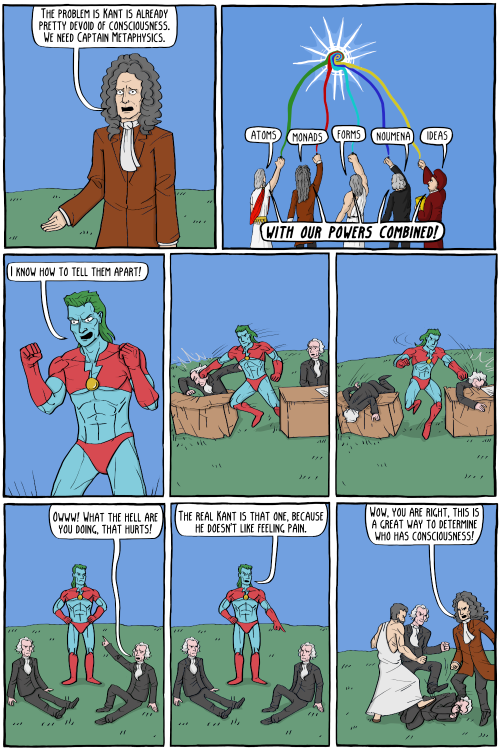#david chalmers
Zombies
Do you believe in zombies? No, not those zombies.Philosophical zombies. They look just like people. In philosophical terms, they are physically identical to us. They have brains, blood flows around their bodies, they laugh at appropriate times, and if you pinch them, they are likely to say ‘Ow!’ Functionally, they are indistinguishable. However, they lack consciousness.
Most of us hope neither kind of zombie exists outside of fiction. While the place of regular zombies is in stories (usually horror), the place of philosophical zombies is in thought experiments (usually in philosophy of mind).
Now here’s why they matter: how do you prove that somebody—even somebody you’ve known for your entire life (e.g., a friend or someone with whom you’re in love)—is not a philosophical zombie?
Sure, you can sense the signals of their body (e.g., the sounds it makes, the light it reflects, the odours it gives off). But on what basis is your experience of them indicative of theirs?
Maybe you deduce mental life in them by analogy to yours. However, this takes a Cartesian leap of faith; for what is your philosophical argument? (Wittgenstein speaks of experience as a ‘beetle in the box’ which can only be inferred in someone else and not articulated, given private language’s inaccessibility.)
Maybe you can send them to a neurophysiologist to find ‘correlates of consciousness’; but this won’t prove experience alone.
In short: in your experience, yours is the only consciousness you are directly aware of.
And here’s the point: if we conceive of philosophical zombies as a logical possibility and believe that humans are distinguishable from them, it follows that we should refute physicalism as a means of explaining consciousness (David Chalmers). Why?
The very conceivability of zombies undermines explanations of consciousness in physicalism’s terms. (Remember, zombies share all our physical features.) We need something else to tell us apart from zombies since physicalism fails to show we are different.
The power of this argument, of course, rests on how conceivable we think zombies are. If you think zombies are conceivable, you have a problem in having no way of verifying others’ consciousness. If you don’t, you are burying your head in the non-philosophical sand until you come up with a reason why.
But what does this argument say about the power of philosophy?
⁂
Maybe it’s best not to think about zombies at all.
ED: Any zombies out there?
SHAUN: Don’t say that!
ED: What?
SHAUN: That.
ED: What?
SHAUN: That. The Z word. Don’t say it.
ED: Why not?
SHAUN: Because it’s ridiculous!
ED: [sighs and rolls his eyes] All right … Are there any out there, though?
—Shaun of the Dead(2004)
(Pictured: Zombies may imitate a smile but do they do not experience happiness. [cottonbro/Pexels])
Post link
So, as you know, back in the summer of 2017 I participated in SRI International’s Technology and Consciousness Workshop Series. This series was an eight week program of workshops the current state of the field around, the potential future paths toward, and the moral and social implications of the notion of conscious machines. To do this, we brought together a rotating cast of dozens of researchers in AI, machine learning, psychedelics research, ethics, epistemology, philosophy of mind, cognitive computing, neuroscience, comparative religious studies, robotics, psychology, and much more.
[Image of my name card from the Technology & Consciousness workshop series.]
We traveled from Arlington, VA, to Menlo Park, CA, to Cambridge, UK, and back, and while my primary role was that of conference co-ordinator and note-taker (that place in the intro where it says I “maintained scrupulous notes?” Think 405 pages/160,656 words of notes, taken over eight 5-day weeks of meetings), I also had three separate opportunities to present: Once on interdisciplinary perspectives on minds and mindedness; then on Daoism and Machine Consciousness; and finally on a unifying view of my thoughts across all of the sessions. In relation to this report, I would draw your attention to the following passage:
All of these meetings were held under the auspices of the Chatham House Rule, which meant that there were many things I couldn’t tell you about them, such as the names of the other attendees, or what exactly they said in the context of the meetings. What I was able tell you, however, was what I talked about, and I did, several times. But as of this week, I can give you even more than that.An objection to this privileging of sentience is that it is anthropomorphic “meat chauvinism”: we are projecting considerations onto technology that derive from our biology. Perhaps conscious technology could have morally salient aspects distinct from sentience: the basic elements of its consciousness could be different than ours.This past Thursday, SRI released an official public report on all of the proceedings and findings from the 2017 SRI Technology and Consciousness Workshop Series, and they have told all of the participants that they can share said report as widely as they wish. Crucially, that means that I can share it with you. You can either click this link, here, or read it directly, after the cut.
Read the rest of 2017 SRI Technology and Consciousness Workshop Series Final ReportatA Future Worth Thinking About



